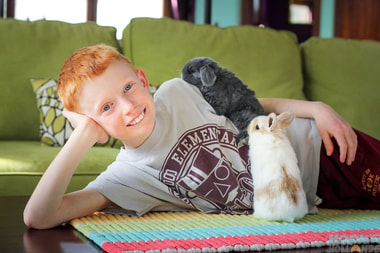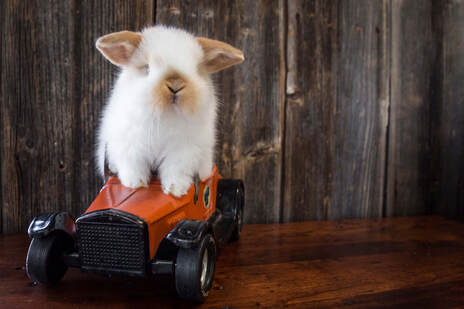Section divider type: clouds --
position: top
Top 7 Questions to Ask when Buying (or Adopting) a Bunny
In order to ensure you are making the best decision about which pet bunny rabbit to bring home, there are some questions you definitely should ask. Don't worry about offending the breeder or shelter/rescue. Reputable businesses and organizations will be welcoming of questions that demonstrate a responsible pet owner, and it just might save you from making a mistake on the wrong bunny for your family.
|
1. Age
If adopting an adult bunny, then age really isn't a crucial factor and may not be able to be determined if the bunny's history is unknown. However, if you are buying a baby or young bunny, then age is pretty important. If you're wondering how long a rabbit lives, it really can range between 4-10 years on average, depending on breed, health, and emergency issues such as stasis (when a rabbit's gut slows/stops and they quit eating). Some states have regulations banning the sale or adoption of bunnies younger than 8 weeks old, and there is good reason. It isn't natural for babies younger than 8 weeks to be without some nutritional supplementation by their mother's milk. In fact, I have had female rabbit babies/juniors as old as 5 to 6 months who I STILL catch snacking at Mom's Milk Bar! This is an extreme example, but baby bunnies have immature immune systems and can become sick or even die if taken from their mothers too young and unweaned. At a minimum, you would want the baby bunny to be 8 weeks of age AND well weaned from its mother (meaning it is eating and drinking completely on its own without loose stool or diarrhea). IDEALLY, find a bunny at least 12 weeks (3 months) old and weaned. Respectable breeders should be open to keeping the bunny for an extra week or two of weaning, and it could save your bunny a lot of stress (and possibly its life). If a breeder argues that a 6-week-old bunny is ready to leave, know that just because they weaned the baby too early doesn't mean it's mature enough to handle the stress of a new environment and being without its mother's milk. |
2. Gender
If you don't have any other pet bunnies in your home and have no preference for a male (buck) or female (doe) rabbit, then you probably don't have a particular urgency to determine your bunny's gender. Scheduling a check-up with your rabbit-savvy veterinarian is always a good idea when getting any new pet, and he/she can also help you identify your bunny's sex.
Have an unaltered buck or doe rabbit already? Is your other pet bunny spayed/neutered but you have a preference for the second bunny's gender? Then you definitely want to have a good idea on your bunny's gender before finalizing the sale or adoption. Keep in mind that an 8-week-old baby bunny can be VERY difficult to sex. I raised baby bunnies for 7 years, and while some bucks and does' little bits were easily scrutinized, others are tiny and perplexing. Gently pressing around the rabbit's vent area can help the genitals to "pop" out, but some are ambiguous until closer to 3/4 months of age (bucks' testicles tend to drop around 4 months, which is a dead giveaway on gender).
TLDR: If gender is important, don't get a baby bunny...opt for an adult or one whose bits and pieces are obvious to the naked eye. If you think you're getting two baby does, you very well could have a baby bunny litter of your own in the near future (rabbits can reproduce as young as 5/6 months of age, and gestation is only a month!). Two bucks will definitely fight if not neutered, so that's also a bad idea.
Not adopting from a rescue and want to learn how to tell a bunny's gender? Watch my YouTube video on identifying your rabbit's gender.
If you don't have any other pet bunnies in your home and have no preference for a male (buck) or female (doe) rabbit, then you probably don't have a particular urgency to determine your bunny's gender. Scheduling a check-up with your rabbit-savvy veterinarian is always a good idea when getting any new pet, and he/she can also help you identify your bunny's sex.
Have an unaltered buck or doe rabbit already? Is your other pet bunny spayed/neutered but you have a preference for the second bunny's gender? Then you definitely want to have a good idea on your bunny's gender before finalizing the sale or adoption. Keep in mind that an 8-week-old baby bunny can be VERY difficult to sex. I raised baby bunnies for 7 years, and while some bucks and does' little bits were easily scrutinized, others are tiny and perplexing. Gently pressing around the rabbit's vent area can help the genitals to "pop" out, but some are ambiguous until closer to 3/4 months of age (bucks' testicles tend to drop around 4 months, which is a dead giveaway on gender).
TLDR: If gender is important, don't get a baby bunny...opt for an adult or one whose bits and pieces are obvious to the naked eye. If you think you're getting two baby does, you very well could have a baby bunny litter of your own in the near future (rabbits can reproduce as young as 5/6 months of age, and gestation is only a month!). Two bucks will definitely fight if not neutered, so that's also a bad idea.
Not adopting from a rescue and want to learn how to tell a bunny's gender? Watch my YouTube video on identifying your rabbit's gender.
3. Health
It's YOUR responsibility to make sure you carefully examine the bunny and look for obvious signs of health issues, as some breeders might not be forthcoming about a rabbit's condition. Here's what to look for:
Eyes - Should be clear and free from discharge. A small bit of crust is usually not a concern, but matting of the fur would indicate a potential issue.
Ears - Clean inside and free from sores/bumps (which can indicate ear mites/canker)
Nose - Free of discharge/matting/wetness (snot is NOT normal in rabbits unless they are sick...could be "snuffles")
Teeth - Top front teeth should be in front of bottom front teeth. If they meet or bottom teeth are in front of the top, this is malocclusion, which is often a lifelong problem.
Vent - The poop chute shouldn't matted with wet poop. Diarrhea can be deadly in rabbits, and excessive soft stool indicates a digestive imbalance
(FYI - rabbits have two kinds of poop: hard, round, dry balls (LOTS OF THESE!) and soft, tiny raspberry-like clusters called cecotropes which are usually eaten for nutrients, though baby bunnies are notorious for smashing these everywhere).

4. Temperament
Depending on your particular situation, you may desire a calm, quiet bunny who comes to you occasionally and on his/her own terms or a more outgoing bunny tolerant of a busy household full of noises and children. By the way, bunnies are NOT good pets for young children, as kids expect bunnies to like to be held and sit in laps, which is completely opposite of most every bunny I've ever met. Bunnies are generally pretty independent of their people and like to be near them but not necessarily ON them. Spaying/neutering usually helps to calm a bunny down, and you may then see a more docile personality emerge. Oppositely, as a baby bunny matures around 4-5 months old, you may notice hormonal behaviors such as spraying (usually only if you have multiple unaltered bunnies sharing spaces), excessive territorial pooping, restless and crazy behavior, mounting objects (or you!), and in some cases aggression.
A unique benefit of adopting an already spayed or neutered bunny is knowing it is unlikely to have hormonal behaviors and may have a more amiable personality (plus you don't have to hassle with getting your bunny surgery).
- How has the bunny been socialized?
- Is the bunny easy to handle or very skittish?
- Does the bunny enjoy being petted? (FYI - most bunnies dislike being carried or held in the lap...they are not lap pets)
- What is the bunny's personality like? Shy and hesitant, timid at first but warms to exploring, curious and friendly, outgoing daredevil
Depending on your particular situation, you may desire a calm, quiet bunny who comes to you occasionally and on his/her own terms or a more outgoing bunny tolerant of a busy household full of noises and children. By the way, bunnies are NOT good pets for young children, as kids expect bunnies to like to be held and sit in laps, which is completely opposite of most every bunny I've ever met. Bunnies are generally pretty independent of their people and like to be near them but not necessarily ON them. Spaying/neutering usually helps to calm a bunny down, and you may then see a more docile personality emerge. Oppositely, as a baby bunny matures around 4-5 months old, you may notice hormonal behaviors such as spraying (usually only if you have multiple unaltered bunnies sharing spaces), excessive territorial pooping, restless and crazy behavior, mounting objects (or you!), and in some cases aggression.
A unique benefit of adopting an already spayed or neutered bunny is knowing it is unlikely to have hormonal behaviors and may have a more amiable personality (plus you don't have to hassle with getting your bunny surgery).
5. Breed, Color, and Pedigree
This really ONLY matters if you are going to show, breed, or use your rabbit in a 4H project. Otherwise, it's basically satisfying your curiosity to ascertain the exact breed, fur coloring, and recent heritage of your bunny.
A GOOD breeder WILL be able to tell you the breed, whether the bunny is purebred, know the color (or at least the general color family if a rare coloring), and tell you if the rabbit comes with a pedigree. Even if the breeder isn't offering a pedigree with the rabbit (pet rabbits and 8-week-old baby bunnies shouldn't come with pedigrees, as their type and quality can't be determined at such an immature age), they should share some basic pedigree info verbally if questioned. I never sold my baby bunnies with pedigrees but always was willing to share the lineage with those who asked.
If adopting a bunny from a rescue or animal shelter, you likely will only be able to guestimate the breed (or mixture of breeds) of your rabbit based upon research of the breeds. If you really want to learn your rabbit breeds, check out ARBA's website (American Rabbit Breeder's Association) and buy their Standards of Perfection booklet.
My Bunny Color Chart can help you to identify some of the most common bunny colors as well as my free rabbit color guide YouTube course below:
This really ONLY matters if you are going to show, breed, or use your rabbit in a 4H project. Otherwise, it's basically satisfying your curiosity to ascertain the exact breed, fur coloring, and recent heritage of your bunny.
A GOOD breeder WILL be able to tell you the breed, whether the bunny is purebred, know the color (or at least the general color family if a rare coloring), and tell you if the rabbit comes with a pedigree. Even if the breeder isn't offering a pedigree with the rabbit (pet rabbits and 8-week-old baby bunnies shouldn't come with pedigrees, as their type and quality can't be determined at such an immature age), they should share some basic pedigree info verbally if questioned. I never sold my baby bunnies with pedigrees but always was willing to share the lineage with those who asked.
If adopting a bunny from a rescue or animal shelter, you likely will only be able to guestimate the breed (or mixture of breeds) of your rabbit based upon research of the breeds. If you really want to learn your rabbit breeds, check out ARBA's website (American Rabbit Breeder's Association) and buy their Standards of Perfection booklet.
My Bunny Color Chart can help you to identify some of the most common bunny colors as well as my free rabbit color guide YouTube course below:
6. Support after the Sale?
Does the shelter or breeder offer email or phone support for questions you may have during transitioning your bunny to your home? What about for health questions that might occur outside of your vet's hours?
All of my bunnies came with lifelong email support, and this most often is in the form of after-hours emergency questions. It's VITAL that you have an emergency vet within driving distance who is experienced with rabbits. If not, have your bunny's regular vet set you up with oral pain meds and hydration for when your bunny has an emergency. Emergencies almost always happen at odd hours or on weekends.
What happens if you need to rehome your bunny? Some shelters or breeders will offer to take the bunny back (without a refund of course). Due to health risks (RHDV2 rabbit virus in particular), I never brought other bunnies back into my rabbitry once they left, but I always was willing to post the bunny for adoption on my website and social media and offer advice on vetting potential new owners. Asking this beforehand can help make the decision regarding which breeder or rescue to choose.
Does the shelter or breeder offer email or phone support for questions you may have during transitioning your bunny to your home? What about for health questions that might occur outside of your vet's hours?
All of my bunnies came with lifelong email support, and this most often is in the form of after-hours emergency questions. It's VITAL that you have an emergency vet within driving distance who is experienced with rabbits. If not, have your bunny's regular vet set you up with oral pain meds and hydration for when your bunny has an emergency. Emergencies almost always happen at odd hours or on weekends.
What happens if you need to rehome your bunny? Some shelters or breeders will offer to take the bunny back (without a refund of course). Due to health risks (RHDV2 rabbit virus in particular), I never brought other bunnies back into my rabbitry once they left, but I always was willing to post the bunny for adoption on my website and social media and offer advice on vetting potential new owners. Asking this beforehand can help make the decision regarding which breeder or rescue to choose.
7. Vet the Breeder
Without throwing any particular breeders under the bus, let me just say that there are unfortunately some less than honest bunny breeders in this world. Sadly, some only seem to care about breeding as many bunny litters as possible and selling them as quickly (and young) as possible. Keep the following in mind when choosing a breeder (or shelter for that matter).
Without throwing any particular breeders under the bus, let me just say that there are unfortunately some less than honest bunny breeders in this world. Sadly, some only seem to care about breeding as many bunny litters as possible and selling them as quickly (and young) as possible. Keep the following in mind when choosing a breeder (or shelter for that matter).
- Can I see the bunny's parents? This will not only give you an idea on the general size and health of the parents but also the overall care provided to the rabbits. Obviously a shelter will have little to know information on the parents. If you can, ask if the parents have any teeth issues, as this can be genetic.
- How do you house your rabbits? If they are kept in small or wire cages without frequent exercise and this goes against your principles, then...find another breeder.
- # of litters per year? Obviously, a breeder could not be forthcoming or truthful about this, but it can be another potential opportunity to further vet their ethics.
- Does the breeder have a website or only social media postings? Every honest breeder I know has at least a bare bones website offering some transparency into their breeding stock, housing, bunny litters, terms, care guides, etc. Sadly, I've had my own rabbits' photos (and even full pages of my website) stolen from me by unscrupulous breeders, so carefully examine the photos for continuity in environment and recency.
- Are YOU BEING ASKED QUESTIONS? If the breeder or rescue has no application or questions to weed out hasty and uncommitted clients, ask yourself why not and where else they might be cutting corners and lacking principles.
Have you found my Top 7 Questions to Ask Before Buying a Rabbit helpful? By being informed on each of these seven areas, you will be equipped to make the best choice possible when deciding which bunny to adopt or purchase.
Section divider type: chrisTrees --
position: bottom







